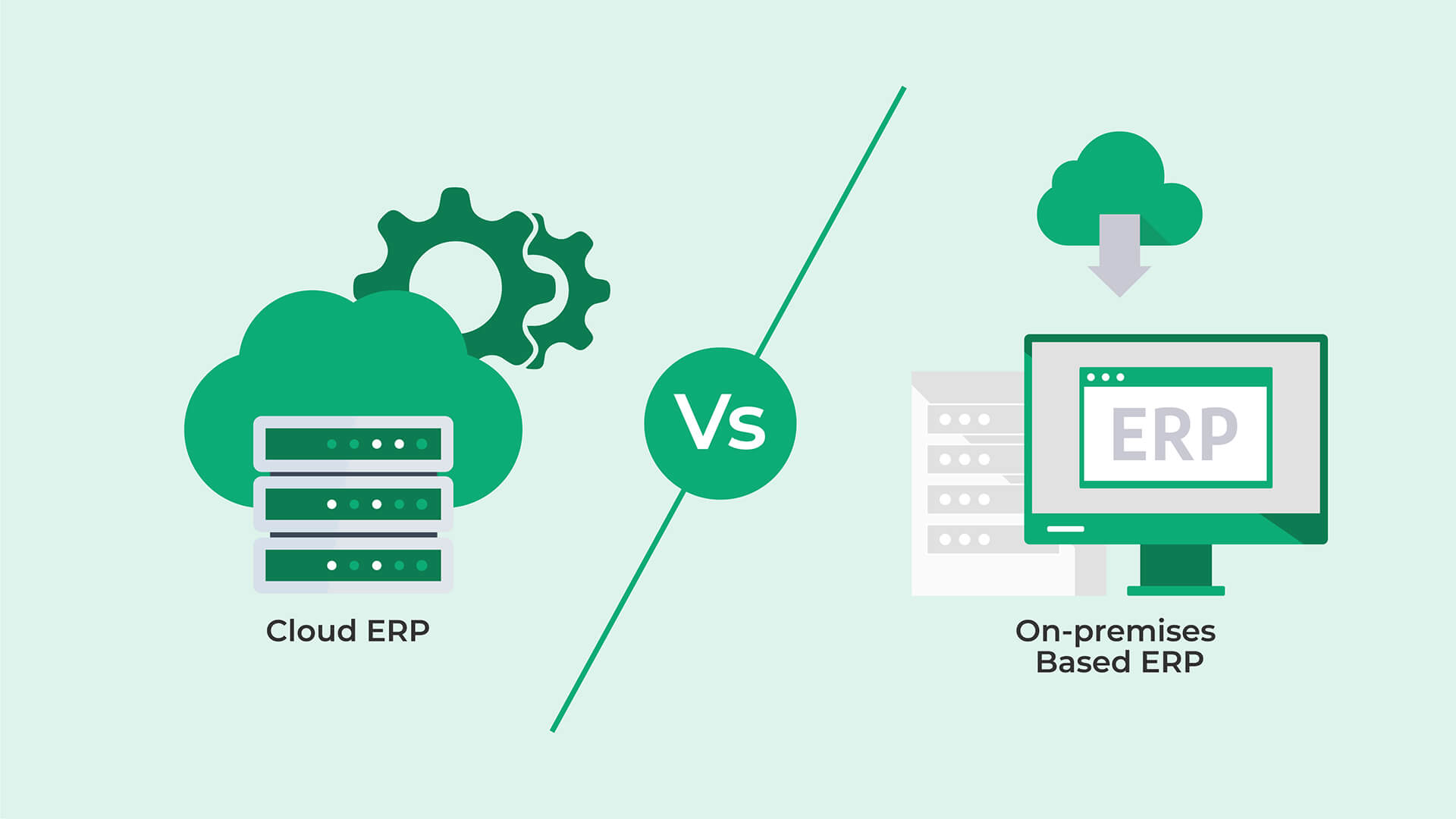Cloud ERP systems, as opposed to on-premises systems, are enterprise resource planning systems that run on a cloud platform and enable organizations to access their ERP over the Internet. There are numerous benefits to integrating, automating, and accessing your essential financial and operational business functions online. Choosing the right ERP provider is the key to unlocking the advantages of a cloud-based approach.
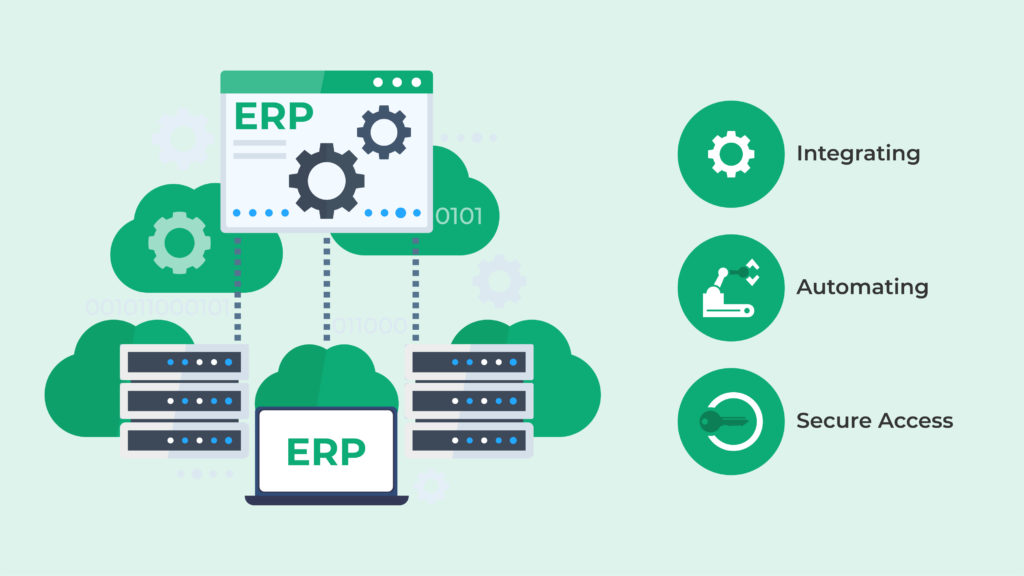
How Does Cloud ERP Work?
Cloud ERP combines a host of technologies connected by high-speed internet networks. Security updates and upgrades are handled by the cloud ERP provider, which leads to a lower cost of ownership than ERP systems hosted with on-premises servers. Cloud ERPs can be accessed remotely via mobile devices or desktop computers, provided that additional security steps are provided, e.g. access via an FTP server. Like any other ERP, this system will tie together your customer information, sales histories, HR management tools, supply chain management, operating metrics, inventory, and financial data into a single source of truth that you can access anywhere.
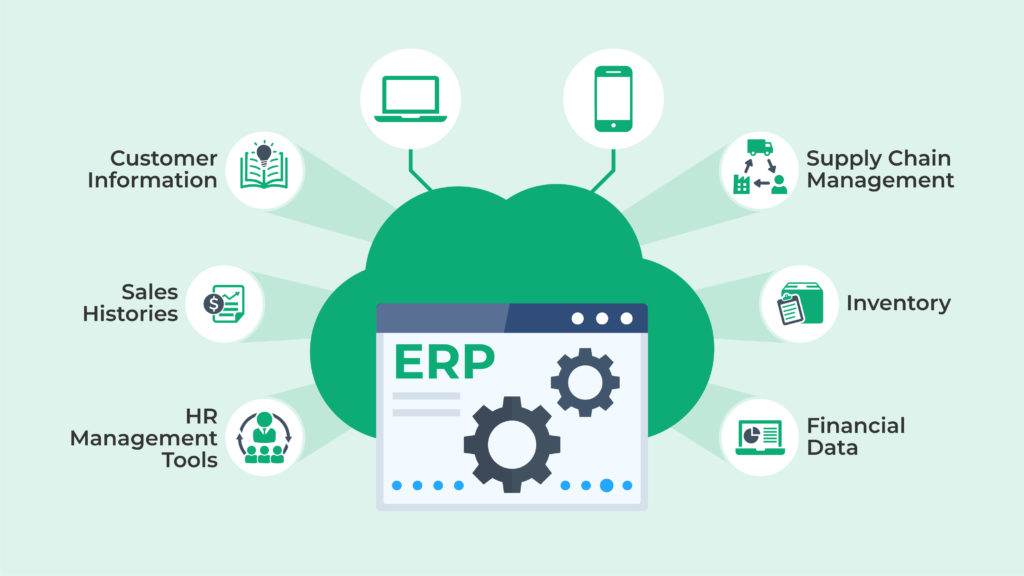
Cloud ERP vs. On-Premises ERP Software Solutions: Which One Is Better?
On-premises ERP is installed by the company’s IT team or through a managed service provider. There are a few significant differences in how this software is managed, implemented, and paid for. On-premises ERP software is licensed upfront, and enterprise-grade servers are bought or leased to run and house the software and data. This approach results in hefty additional costs for maintenance, supplementary software, updates, customization, insurance, security, and backups.
Cloud-based ERP is hosted and managed by a provider, usually with an “as-a-service” model through the cloud. The provider takes on the responsibility of data storage, maintenance, physical data center infrastructure, security updates, backups, and upgrades. This enables the company to roll out the ERP solution in a faster, cheaper, and more flexible way.
Additionally, scaling up is much easier with a cloud ERP than on-premises. An on-premises solution requires significant additional resources and infrastructure when you are scaling up in order to provide an appropriate level of maintenance and security. Cloud hosting, on the other hand, puts the burden of maintenance and security on the provider, whose sole job is to ensure data integrity and security. Additionally, cloud hosts have servers ready to spin up when scaling – no need to stop and install new hardware.
Types of Cloud Hosting for ERP
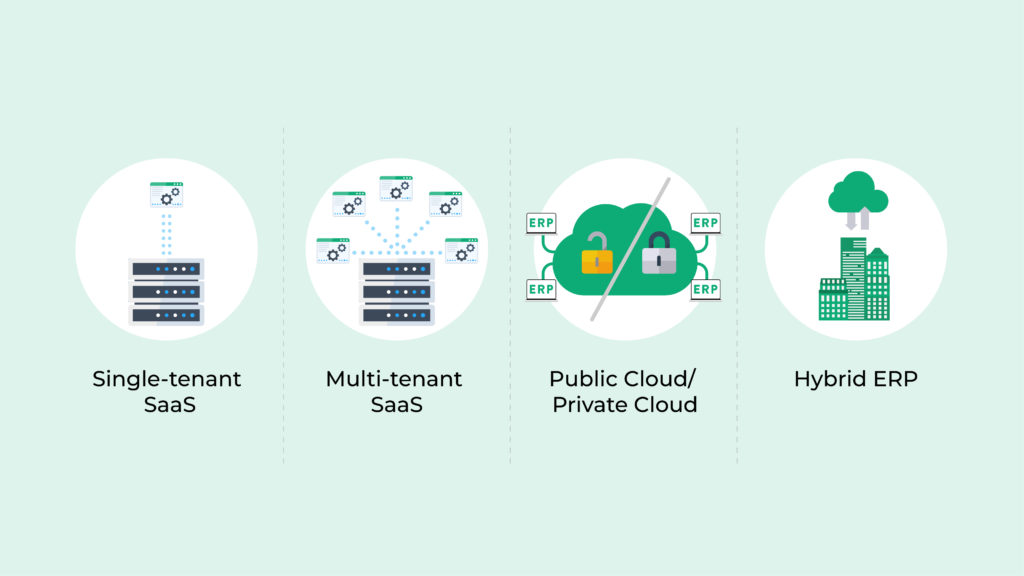
There are several different types of cloud hosting to consider, with their own pros and cons. Many legacy ERP vendors have retrofitted their software to run off their own data centers. These are technically cloud-based ERPs, but going this route may mean that you miss out on the many benefits of a full cloud-based ERP. This includes having access to resources as well as the simplification of upgrades and maintenance that a solution born and built in the cloud can offer. Here are some of the different types of cloud hosting options you may encounter:
Multi-tenant SaaS
A single version of the ERP software and its associated infrastructure serves multiple organizations. Data is consolidated on as few servers as possible to minimize maintenance costs and simplify version updates. Companies can only access their own data.
Single-tenant SaaS
A single version of the ERP software and its infrastructure serves a single company, e.g., the data is hosted on private servers running a unique instance. Some cloud ERP companies offer a choice between a private instance or a shared instance.
Public Cloud / Private Cloud
In the public cloud, multiple organizations share cloud computing services, such as Amazon Web Services, Microsoft Azure, and Oracle Cloud. The private cloud is a service not shared by any other organization.
Hybrid ERP
Hybrid cloud hosting systems for ERP combine on-premises software with a private cloud that is used for computing, storage, and services so that companies can access the best of both worlds.
The Benefits of Cloud ERP Software
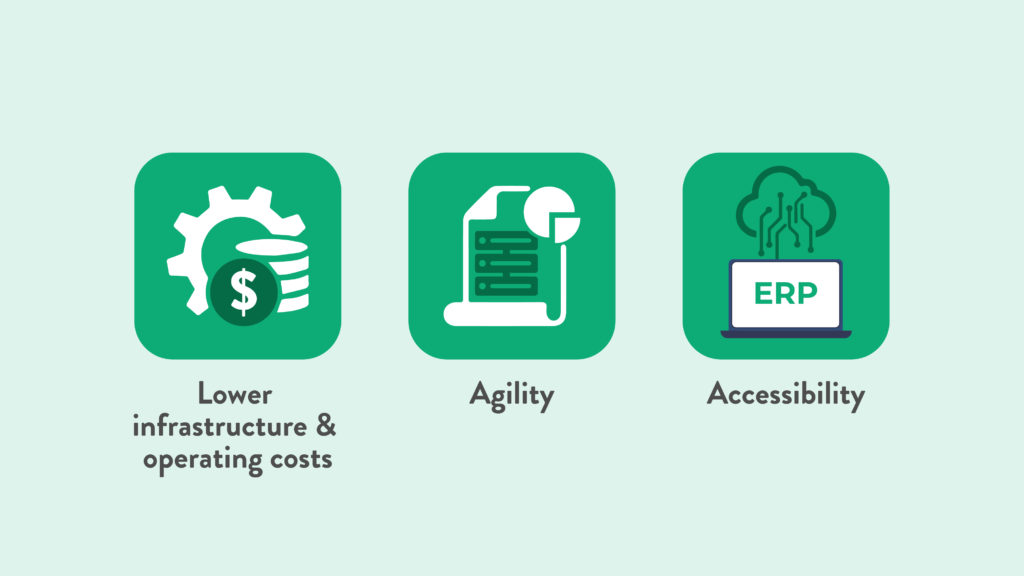
In a Gartner survey, most companies that moved to a cloud ERP said they did so in order to improve business processes (64%), because their existing ERP simply didn’t meet their needs anymore (48%), or was unsupported (47%). Cloud ERP solutions are so popular because they enable companies to be more agile and scale along with the company. Some of the inherent benefits of cloud ERP software include:
Lower infrastructure and operating costs
With a cloud ERP system, costs are reduced from implementation onwards. There is no need to invest in servers, database creation, consultants, IT staff, security, or backup. Running costs are much lower as maintenance, IT support, updates, and additional servers are provided by the cloud ERP provider, cutting at least 30% of the cost.
Agility
Cloud-based ERPs grow with the business without requiring additional investment in servers or staff. Cloud vendors aim for five-nines (99.999%) availability at all times, which means that your unplanned downtime shouldn’t exceed 8 minutes spread across an entire year. Cloud ERP systems can be customized to fit your business needs as it changes, which is something on-premises ERP systems are loath to do because reimplementing the software (if customizations are done in-house) can be difficult. Cloud ERP can integrate well with other cloud products, enabling the provider to add new modules without downtime. This effectively future-proofs your business by giving you the ability to proactively respond to shifts in the market.
Accessibility
Cloud-based ERP users can access business information from anywhere, from any device, in real-time. This means that employees can remain productive and active in their roles from anywhere in the world. Upgrades can be done speedily and with minimal downtime without hiring contractors to manage the process, and cloud-based ERP providers can offer best-of-breed security and compliance so that your data remains safe and accessible at all times.
How to Choose a Cloud ERP Software
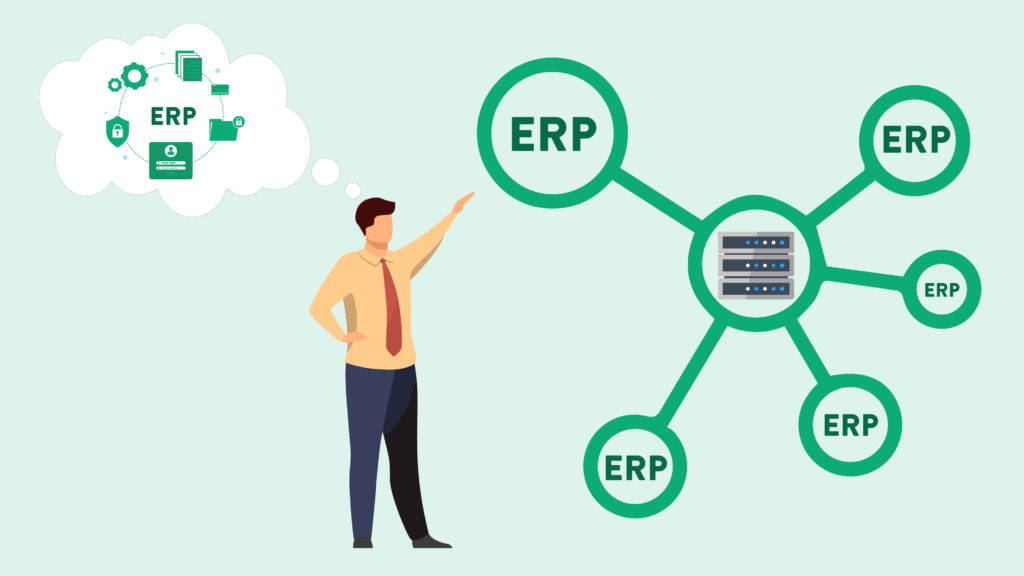
If you’ve been using on-premises ERP systems for years, the mental shift (and physical migration) can pose a challenge. The resistance often comes from IT administrators who may not want to give up control over processes that become automated and managed by external vendors. However, with the right provider at your side, the change can be swift, simple, and easy.
You could be tempted to go straight for the larger and best-known brands, such as Oracle Cloud ERP or SAP S/4HANA. Both have their benefits for sure: Enterprise-grade solutions come with strong project management modules, data extraction capabilities, and high levels of security, but there are weaknesses, too. Some of the biggest names in the industry have been around for decades and still carry some of that legacy mindset in their operations. Native connectors are limited, documentation can be poor, which results in a significant learning curve, and price transparency isn’t high up on the agenda.
There are many smaller companies that perform better than their enterprise-grade counterparts simply because there’s less red tape and more hands-on support.
When making your final decision, start by looking at your business requirements. This will usually dictate the modules and applications you’ll need. Vendors should be able to present options that align with your business objectives and should support customization so that you can add or remove functionality as your business needs change.
Next, look at the support network you’ll receive. You aren’t just paying for software, but for the vendor’s services and ongoing support. Will the vendor offer integration and migration assistance, customization, and training, or palm you off to an expensive consultant? Migration will be key, and you will be entirely dependent on your cloud-based ERP software vendor. They need to ensure a simple and effective migration from the on-premises solution to the cloud without data losses.
Lastly, make sure that the solution you choose can scale with you, manage your computing and storage needs, and is fully compliant with your local laws and regulatory requirements. Their data centers should offer the best possible security, redundancy, and scalability.
At 10X ERP, we work with some of the best cloud platforms on the market to ensure our client’s information is kept safe and accessible while being highly scalable. If you’re considering moving to a cloud ERP, get in touch with us. We’d love to help!
